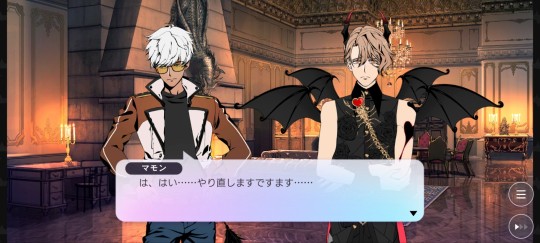#the one that's like 'desu ne is japanese for innit'
Explore tagged Tumblr posts
Text
starkid should do the same setlist as it's starkid innit but in japan and call it starkid desu ne
#it's the same name.#i think about that one post so fucking much you don't understand#the one that's like 'desu ne is japanese for innit'#because why is that the most fucking concise brilliant explanation for ne i've ever seen#starkid#iski#starkid innit#sk innit#icbiballtay#kinda sorta relevant. let me live
11 notes
·
View notes
Text
So I've seen some discussion about the way Mammon talks in 24-11, and how some think Asmo forced Mammon to speak this way while others think it might be because of a issue with the translation. And since I speak some Japanese, I figured I'd break down what's actually going on here

If you don't want to read through the Japanese grammar explanation, just skip to the last section, but for everyone else I'll try to break it all down. Just keep in mind that I'll simplify some things to (hopefully) make it easier to understand for those that don't speak Japanese
Right away, here's the dialogue above in the Japanese version + written in Romaji for those that can't read Japanese:


understanding sentence-ending particles
(not really relevant to Mammon's dialogue itself, but I think it'll help make the function of 「です」 ('desu') and 「ます」 ('masu') in the next section a little clearer)
Sentence-ending particles serve to indicate the overall tone a sentence is meant to have. There are a few of them and each one gives the meaning of the sentence a different nuance
The two easiest examples to understand this concept are probably the following:
the 「か」 ('ka') particle basically just a spoken question mark; turns any sentence into a proper question
the 「ね」 ('ne') particle literally functions the same way as 'isn't it'
ちょっと寒い。 ('chotto samui') -> It's a little cold.
ちょっと寒いか。 ('chotto samui ka') -> Is it a little cold?
ちょっと寒いね。 ('chotto samui ne') -> Bit cold, innit? It's a little cold, isn't it?
the auxilary verbs 「です」 ('desu') and 「ます」 ('masu')
Similarly to the sentence-ending particles, these two change the tone of the sentence and are placed at the end. Both make the sentence polite, and depending on what the sentence ends with, you use one or the other. If it ends in a verb, you add 「ます」 ('masu') at the very end, and if it ends in anything else you use 「です」 ('desu')—you cannot use both back to back
Which finally brings us back to Mammon's dialogue

As you can see, he goes a little overboard. Since 「やり直す」 ('yari naosu'; 'to redo') is a verb, the first use of 「ます」 ('masu') is correct, but everything after that is just overkill and wrong but it sounds very cute (The way Mammon speaks here actually reminds me of how half of my classmates used to speak the first few weeks of uni lol)
But yeah, it's definitely not Asmo forcing Mammon to speak differntly since all of the brothers are talking more politely. And given that they're all under Asmo's charm and serving him, it makes sense that they'd adopt a similar manner of speaking as Barbatos. It's just that Mammon is the King of Casual Speech™, dancing gracefully between 'still acceptable' and 'straight up rude' more or less gracefully at least, so obviously he'd struggle with switching to a more butler-like speech style
It's the same with Beel actually. He's usually the type to just cut straight to the point, which is why he also slightly messed up when speaking politely. To me the original Japanese version reads more like a cute little joke that's in line with both their character, that unfortunately got lost in translation since English just doesn't have an equivalent
#i was part of the other half of the class that kept forgetting to use 'desu' at all sdhfhssdhf#also the way i cackled when i read lucifer using 「かしこまりました」#something about it is just so much funnier than 'as you wish'#obey me#obey me nightbringer#obey me mammon#obey me asmodeus#obey me beelzebub#obey me nightbringer mammon#obey me nightbringer asmodeus#obey me nightbringer beelzebub#mel's starry musings
293 notes
·
View notes